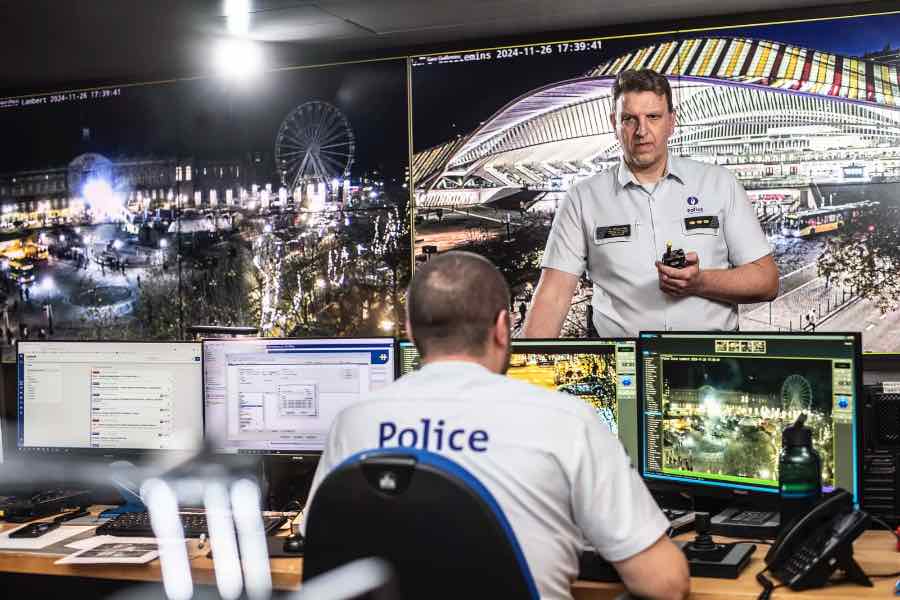
End of year festivities: how does Liège use telecommunications for its security?
At the end of the year, the city of Liège is well-known for its nickname of the ardent city due to its liveliness. After the Liège Fair, which brought together more than two million people, the Christmas market, spread over three sites, plans to bring together just as many. How can these large gatherings be managed? What are the major challenges in terms of security and communication between services? CDP Olivier Marichal, Operational Director of the Liège Police Zone, tells us.
Multiple services
In the heart of the Liège Police zone alone, nearly 1,180 employees work side by side, with very diverse professions: administrative and logistics management, proximity, public order, anti-banditry squad, canine brigade, mobility service, victim assistance, intervention services, event management center, etc.
At the head of the Operational Department of Population Services for a year and a half, CDP Olivier Marichal's mission is to make these teams work together and with the city's other services: "there is a real culture of partnership in Liège, a real multidisciplinarity", he explains.
The solution: coordination
On a daily basis as well as in the event of a problem, it is the coordination between the services that remains decisive, in addition to the training, preparation and emergency planning phase. Capturing the citizen's message, transmitting it to a team, accurately interpreting what is said and acting accordingly is essential. Communication methods, such as the ASTRID radio network, are therefore essential tools for ensuring this coordination. "Verbal orders remain a priority, it is our priority channel. When a crisis occurs, speaking and exchanging remains the most critical," says Olivier Marichal.
Belgium recognized for its multidisciplinarity
"We regularly meet with the authorities of foreign metropolises to exchange ideas and, in terms of emergency planning, Belgian multidisciplinarity is recognised". When an 85m-high residential tower catches fire in June 2024, transversality and solidarity are immediately activated: the cities of Antwerp and Brussels spontaneously offer their help, the local police, the federal police and civil protection send their drones as support to communicate with the residents who have taken refuge on the balconies... "In all our debriefings after this type of event, it is the need to communicate that remains the most important".
Festive moments that must remain so
"The Liégeois is festive, there are many activities in Liège and we must ensure that everything goes well and that our citizens can meet in a good atmosphere", adds Olivier Marichal. The Event Management Center (CGE) answers calls from citizens (118,588 calls per year) and supports interventions with its surveillance cameras. As soon as an intervention is announced, the cameras connect and provide them with information via ASTRID. If an incident occurs, the various administrative authorities concerned are directly informed by radio and meet very quickly within the CGE.
Full collaboration upstream
During large gatherings, such as the Les Ardentes festival in the summer, the collaboration of all departments begins well in advance of the event. The city departments, organizers, firefighters and emergency services consult each other during preparation meetings. During the event, an Event Control Center is set up on site, equipped with screens to closely monitor the mobile cameras placed at strategic locations throughout the festival. During each event, a committee composed of the departments affected (medical assistance, firefighters, police, TEC, mayor's office, etc.) is thus formed.
A new mobility challenge
The imminent arrival of the tram in Liège represents a new challenge in terms of security. "This creates a lot of risks, because it is a big change in the habits of the people of Liège when they travel around the city. However, it has priority, it does not stop. This will clearly require some time to adapt. We are preparing for it, in consultation with the municipal authorities and the emergency services."
The need to feel protected
It is understood that the personnel operating within the Liège Police zone must be prepared for all situations. According to Olivier Marichal, whether it is a neighborhood inspector carrying out a routine visit or a team in the middle of an intervention, the radio guarantees safety. "An operator who picks up his radio knows that he will be able to call, whatever happens. He should not ask himself questions or fear not being able to make a call. The radio allows him to communicate in all circumstances."
